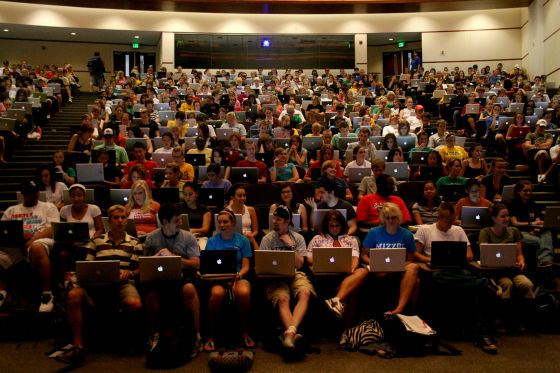Blogger is judged to be guaranteed rights as a journalist

ByMike Stenhouse
In a trial conducted on Friday, January 17, 2014, a ruling was given that bloggers were regarded as journalists with regard to Article 1 amending the Constitution which guarantees freedom of speech and expression. According to this ruling, even those who do not belong to a formal press agency, the constitutionally guaranteed the same rights as journalists, even those who write blogs as a hobby after returning home, for example, are legally treated as journalists .
U.S. Court: Bloggers Are Journalists - Robinson Meyer - The Atlantic
http://www.theatlantic.com/technology/archive/2014/01/us-court-bloggers-are-journalists/283225/

The ruling was sued for defamation on blog postsCrystal CoxThings about Ms. 's case. In 2010, self-proclaimed "research blogger"Crystal CoxPosted an article on Obsidian Finance and its affiliated companies as suspected of tax evasion or money laundering. Since the article was posted on a website named "obsidianfinancesucks.com" (Obsidian Finance is fucking dot com), Obsidian and partner Kevin Padrick filed an appeal against Cox.
As a result of the deliberation, Judge Marco Hernandez of the Oregon District Court stated, "While Cox's blog post is quite exaggerated, it is one view, it can not be considered as a majority of defamation," while "only one We ordered Obsidian and Kevin Padrick to pay approximately 2.5 million dollars (approximately 260 million yen) for compensation, excluding articles.
Oregon's rulingThenWhat is a journalist?Although it was contested in the point that it said that it is not a journalist unless it can fulfill the following properties according to the judgment.
· Have you received education in the field of journalism?
· Is there document or evidence supporting a relationship with a publicly recognized press?
· Is there evidence that it followed the norms of journalism such as editing, fact confirmation, disclosure of conflicts of interest?
· Have you taken notes during the conversation and interview
· Have mutual understanding or agreement on confidentiality exist between the defendant and the information source
· Is not it just a collection of sentences or publications from other people, is it a work independently made?
· Have you also contacted the "opposite side" to obtain the story on both sides?
Cox also made anonymous sources of information on Obsidian Finance Group's tax evasion and was guaranteed by Oregon's Media Protection Act, but Judge Hernandez said Cox said "Article 2500 dollars (about 260,000 yen) I declined to apply the law because I claimed to stop posting. "
Regarding this trial, David Carr, a New York Times reporter, denied article journalism as "Cox is not telling the whole story", and what is a journalist has become a big issue.

ByStephan Geyer
However, as a result of appeal, the 9th Circuit Court overturned the ruling on 17th January 2014. There are two cases related to this. One is a judgment of the Supreme Court in 1964 that celebrities can appeal opponents with defamation only when fake information is "swamped by" real malice. " The other is a ruling issued in 1974, "If wrong information about an individual is carelessly flushed, it can be defamatory."
In light of these, Obsidian and Kevin Padrick are famous, Cox's post dealt with public concerns, so they were not admitted to be malicious and were inadvertently swept away Because it is not a thing, it can not be defamation.
The 1974 precedent that "erroneous information concerning individuals can be made libelous even if inadvertently swept" can not be applied when Cox is considered not part of the news agency. So, Cox who is a blogger is a journalist? Judge Hurwitz said, "Until now the Supreme Court has never adopted the 1974 precedent in addition to any specific press, and it is a major case of defamation that the first amendment of the Constitution of the United States poses a problem "Although we did not use it," we stated that "we will not draw a line on whether it is an institutional media or not." And "With the advent of the Internet publications and broadcast media have declined, the boundary line of people commenting on traditional media and political / social topics has become ambiguous," said Cox, a blogger, I regard it as a journalist in Article 1.

ByChris Corwin
Related Posts:
in Note, Posted by darkhorse_log







